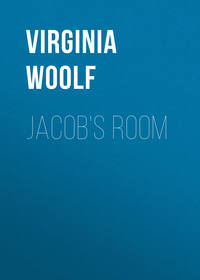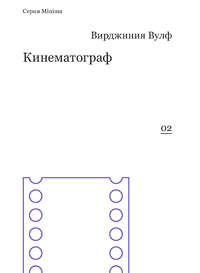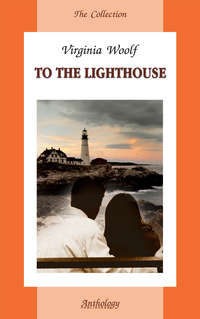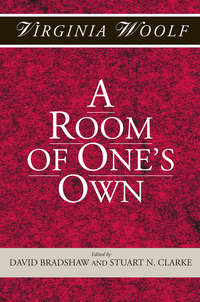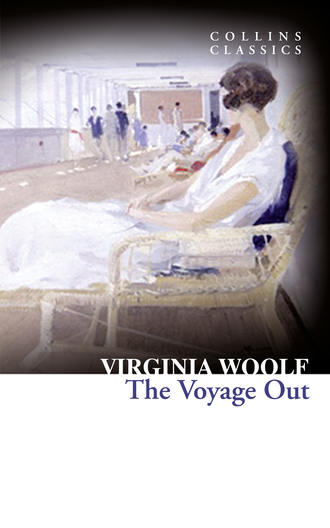
Полная версия
The Voyage Out

THE VOYAGE OUT
Virginia Woolf

History of Collins
In 1819, millworker William Collins from Glasgow, Scotland, set up a company for printing and publishing pamphlets, sermons, hymn books and prayer books. That company was Collins and was to mark the birth of HarperCollins Publishers as we know it today. The long tradition of Collins dictionary publishing can be traced back to the first dictionary William published in 1824, Greek and English Lexicon. Indeed, from 1840 onwards, he began to produce illustrated dictionaries and even obtained a licence to print and publish the Bible.
Soon after, William published the first Collins novel, Ready Reckoner; however, it was the time of the Long Depression, where harvests were poor, prices were high, potato crops had failed and violence was erupting in Europe. As a result, many factories across the country were forced to close down and William chose to retire in 1846, partly due to the hardships he was facing.
Aged 30, William’s son, William II took over the business. A keen humanitarian with a warm heart and a generous spirit, William II was truly ‘Victorian’ in his outlook. He introduced new, up-to-date steam presses and published affordable editions of Shakespeare’s works and The Pilgrim’s Progress, making them available to the masses for the first time. A new demand for educational books meant that success came with the publication of travel books, scientific books, encyclopaedias and dictionaries. This demand to be educated led to the later publication of atlases and Collins also held the monopoly on scripture writing at the time.
In the 1860s Collins began to expand and diversify and the idea of ‘books for the millions’ was developed. Affordable editions of classical literature were published and in 1903 Collins introduced 10 titles in their Collins Handy Illustrated Pocket Novels. These proved so popular that a few years later this had increased to an output of 50 volumes, selling nearly half a million in their year of publication. In the same year, The Everyman’s Library was also instituted, with the idea of publishing an affordable library of the most important classical works, biographies, religious and philosophical treatments, plays, poems, travel and adventure. This series eclipsed all competition at the time and the introduction of paperback books in the 1950s helped to open that market and marked a high point in the industry.
HarperCollins is and has always been a champion of the classics and the current Collins Classics series follows in this tradition – publishing classical literature that is affordable and available to all. Beautifully packaged, highly collectible and intended to be reread and enjoyed at every opportunity.
Life & Times
Mental Health and Creativity
It would be fair to say that Virginia Woolf was an intense and complex personality. Some might describe her as highly imaginative, sensitive and creative, while others might use the words high-maintenance, introspective and obsessive. In truth, she was all of the above, which meant that she was highly regarded as a novelist by many and entirely disregarded by others.
The central sticking point with the latter was that she came from a highly privileged, upper-middle-class background, yet she viewed the world in quite a negative light. Untroubled by the daily pressures of most, her time was spent in deep analysis of life – or rather, her own life and that of her friends and family. Her literature, therefore, could occasionally disconnect with the lay reader, because her concerns could be seen as self-indulgent and focused on a rarified environment to which most people were not privy.
As a human specimen, Woolf was not a very robust figure. She was prone to bouts of depression and breakdown, in part possibly brought on by the lack of any necessity to just get on with activities that were positive for her mental and physical constitution. In the absence of responsibilities to toughen the character, she lived in a world of ever-decreasing circles until, one day, her horizons closed in so tight that she chose suicide as a means of escape. She filled the pockets of her overcoat with pebbles and walked headlong into a river to drown her sorrows, quite literally. Her life was ended by her own thoughts and actions at the age of 59.
Woolf is a classic case of an artist whose creative expression was bad for their health. Had she abandoned writing in favour of an occupation that took her mind away from her obsessive thoughts, she would undoubtedly have lived a happier and more fulfilled life, but instead she became the author of her own undoing. So, a weighty question remains: was it worth all the pain and suffering? Inevitably those with similar leanings will say yes, because they are able to identify with Woolf’s desire to commit her thoughts to the written word as a kind of catharsis. Inevitably those who cannot identify will say no, because her work offers nothing to which they can relate as they have no need of therapy. It may be that there has never been a more divisive novelist in the history of English literature, and this is probably Woolf’s most interesting aspect.
Woolf’s main influence on modern literature was her ‘stream of consciousness’ approach to prose. Her novels were really vehicles for the copious current of thoughts and emotions to flow without parameters. She was an aesthete and intelligentsium, investing all of her mental capacity into understanding and disseminating the minutiae of human nature, human society, human culture and the human condition. Woolf and her set could be seen as looking down on those who chose not to analyse human existence in such microscopic detail, but realistically this was probably the result of insecurities about one’s own talent, context and significance. The one thing that is certain about belief systems is that believing things doesn’t make them true. This is certainly not to say that Woolf’s portfolio has no value – far from it – but that we do well to remember the context of the author. After all, it was precisely because she existed in her particular milieu that she produced her pioneering style of literature. Moreover, had she been born into a more typical, lower-middle or working class background, she would probably not have had the wherewithal to dissect humanity to such a level.
The Voyage Out
Her first novel, The Voyage Out, had a difficult gestation and birth, not least because she was deeply critical of Edwardian society that her friends and family advised her to make revisions for the sake of preserving her reputation. After five years of to-ing and fro-ing she finally arrived at a manuscript that was deemed acceptable, although not to her.
This set the precedent for her forward approach to literature, as she was not of the ilk who saw novels as entertainment and struggled to understand that publishers regard them as product. To Woolf, The Voyage Out should have been a revealing and stark glimpse inside her head, as if her mind had been cleaved open for the whole world to see. To the publisher, the book simply needed to be an engaging and representative read. The plot for The Voyage Out tells of a young woman on an ocean voyage to varying locations and alongside various other personalities. The central character appears to be Woolf herself, and the plot is a device to allow her to make observations about the people and society in which she rotates, rather like a goldfish in a bowl. The title alludes to her own journey from adolescence to adulthood, which coincided with her family’s relocation from Kensington to Bloomsbury, where she became part of an intellectual elite known as the Bloomsbury Set. Together, they were all goldfish in the same bowl, looking out at the world around them with a similar artistic palette.
The pretentions of her social group actually allowed her to blossom as a writer, because she was given the encouragement and freedom she needed to experiment with her prose. In short, she was allowed to think of herself as an author and she was told what she wanted to hear. This was vitally important to someone with nagging self-doubt, so she developed deep and lasting bonds with those who saw and nurtured her potential. Indeed, she married one of them – Leonard Woolf – and remained devoted to him.
The Bloomsbury Set
In time, of course, the pretentions of the Bloomsbury Set transcended into success, as they were undoubtedly intelligent, talented and well educated. This process of ascendance was, in part, aided by a number of stunts designed to draw public attention. One stunt in particular has become famous for its daring and humour: the Dreadnought Hoax. This was an elaborate plan to gain egress to the battleship HMS Dreadnought for no other reason than to have a good look around. A number of the Bloomsbury Set, including Woolf, disguised themselves as Abyssinian princes. They wore the appropriate garb of robes and turbans, but they also ‘blacked-up’ and sported fake beards. With escort and interpreter in tow, they boarded a VIP coach and took a train from Paddington to Weymouth, where they were received as genuine royalty with honour guard and allowed to inspect Royal Navy fleet. All the while, they pretended to communicate in a foreign tongue by uttering gibberish furnished with Greek and Latin, which the interpreter duly pretended to understand and translate.
Having returned to London, a photograph of the Bloomsbury Set, still in character, was sent to the Daily Mirror newspaper and the hoax was revealed. Not surprisingly, the affair turned into a scandal. The Foreign Office and the Royal Navy were the target of a great deal of finger-pointing, partly in fun and partly in seriousness for allowing such a blatant lapse in national security. The situation wasn’t helped by the fact that the Bloomsbury Set were pacifists, which only served to rub salt into the wound. When the Navy high command pushed to have the perpetrators punished, they found themselves powerless to do anything. For one thing, no laws were broken, and secondly the consensus was that they themselves should be punished for allowing themselves to be beguiled by such a lame practical joke.
Needless to say, the Dreadnought Hoax planted the Bloomsbury Set in the public consciousness once and for all, as the oxygen of publicity was theirs to breathe in and enjoy. The hoax occurred on 7 February, 1910. Woolf’s first novel was begun the same year, although she did not publish until 1915, by which time she was already a minor celebrity.
Despite her subsequent success, Woolf was never particularly contented, however, for she had such a troubled soul and indefatigable mind. Today her malady would, doubtless, be described as a bipolar condition, for she oscillated from exuberant mood highs to despairing clinical lows. In the end, she was convinced that she would never come full circle again, so she decided to cut her loses while in the grip of a crushing depression that rendered her unable to see any light at the end of the tunnel. Virginia Woolf died in 1941, leaving behind a highly respected, progressive and considerable canon of essays, critique and novels.
CONTENTS
Title Page
History of Collins
Life & Times
Chapter 1
Chapter 2
Chapter 3
Chapter 4
Chapter 5
Chapter 6
Chapter 7
Chapter 8
Chapter 9
Chapter 10
Chapter 11
Chapter 12
Chapter 13
Chapter 14
Chapter 15
Chapter 16
Chapter 17
Chapter 18
Chapter 19
Chapter 20
Chapter 21
Chapter 22
Chapter 23
Chapter 24
Chapter 25
Chapter 26
Chapter 27
Classic Literature: Words and Phrases adapted from the Collins English Dictionary
Copyright
About the Publisher
CHAPTER 1
As the streets that lead from the Strand to the Embankment are very narrow, it is better not to walk down them arm-in-arm. If you persist, lawyers’ clerks will have to make flying leaps into the mud; young lady typists will have to fidget behind you. In the streets of London where beauty goes unregarded, eccentricity must pay the penalty, and it is better not to be very tall, to wear a long blue cloak, or to beat the air with your left hand.
One afternoon in the beginning of October when the traffic was becoming brisk a tall man strode along the edge of the pavement with a lady on his arm. Angry glances struck upon their backs. The small, agitated figures—for in comparison with this couple most people looked small—decorated with fountain pens, and burdened with despatch-boxes, had appointments to keep, and drew a weekly salary, so that there was some reason for the unfriendly stare which was bestowed upon Mr. Ambrose’s height and upon Mrs. Ambrose’s cloak. But some enchantment had put both man and woman beyond the reach of malice and unpopularity. In his guess one might guess from the moving lips that it was thought; and in hers from the eyes fixed stonily straight in front of her at a level above the eyes of most that it was sorrow. It was only by scorning all she met that she kept herself from tears, and the friction of people brushing past her was evidently painful. After watching the traffic on the Embankment for a minute or two with a stoical gaze she twitched her husband’s sleeve, and they crossed between the swift discharge of motor cars. When they were safe on the further side, she gently withdrew her arm from his, allowing her mouth at the same time to relax, to tremble; then tears rolled down, and leaning her elbows on the balustrade, she shielded her face from the curious. Mr. Ambrose attempted consolation; he patted her shoulder; but she showed no signs of admitting him, and feeling it awkward to stand beside a grief that was greater than his, he crossed his arms behind him, and took a turn along the pavement.
The embankment juts out in angles here and there, like pulpits; instead of preachers, however, small boys occupy them, dangling string, dropping pebbles, or launching wads of paper for a cruise. With their sharp eye for eccentricity, they were inclined to think Mr. Ambrose awful; but the quickest witted cried “Bluebeard!” as he passed. In case they should proceed to tease his wife, Mr. Ambrose flourished his stick at them, upon which they decided that he was grotesque merely, and four instead of one cried “Bluebeard!” in chorus.
Although Mrs. Ambrose stood quite still, much longer than is natural, the little boys let her be. Some one is always looking into the river near Waterloo Bridge; a couple will stand there talking for half an hour on a fine afternoon; most people, walking for pleasure, contemplate for three minutes; when, having compared the occasion with other occasions, or made some sentence, they pass on. Sometimes the flats and churches and hotels of Westminster are like the outlines of Constantinople in a mist; sometimes the river is an opulent purple, sometimes mud-coloured, sometimes sparkling blue like the sea. It is always worth while to look down and see what is happening. But this lady looked neither up nor down; the only thing she had seen, since she stood there, was a circular iridescent patch slowly floating past with a straw in the middle of it. The straw and the patch swam again and again behind the tremulous medium of a great welling tear, and the tear rose and fell and dropped into the river. Then there struck close upon her ears—
Lars Porsena of Clusium
By the nine Gods he swore—
and then more faintly, as if the speaker had passed her on his walk—
That the Great House of Tarquin
Should suffer wrong no more.
Yes, she knew she must go back to all that, but at present she must weep. Screening her face she sobbed more steadily than she had yet done, her shoulders rising and falling with great regularity. It was this figure that her husband saw when, having reached the polished Sphinx, having entangled himself with a man selling picture postcards, he turned; the stanza instantly stopped. He came up to her, laid his hand on her shoulder, and said, “Dearest.” His voice was supplicating. But she shut her face away from him, as much as to say, “You can’t possibly understand.”
As he did not leave her, however, she had to wipe her eyes, and to raise them to the level of the factory chimneys on the other bank. She saw also the arches of Waterloo Bridge and the carts moving across them, like the line of animals in a shooting gallery. They were seen blankly, but to see anything was of course to end her weeping and begin to walk.
“I would rather walk,” she said, her husband having hailed a cab already occupied by two city men.
The fixity of her mood was broken by the action of walking. The shooting motor cars, more like spiders in the moon than terrestrial objects, the thundering drays,
the jingling hansoms, and little black broughams, made
her think of the world she lived in. Somewhere up there above the pinnacles where the smoke rose in a pointed hill, her children were now asking for her, and getting a soothing reply. As for the mass of streets, squares, and public buildings which parted them, she only felt at this moment how little London had done to make her love it, although thirty of her forty years had been spent in a street. She knew how to read the people who were passing her; there were the rich who
were running to and from each others’ houses at this hour; there were the bigoted workers driving in a straight line to their offices; there were the poor who were unhappy and rightly malignant. Already, though there was sunlight in the haze, tattered old men and women were nodding off to sleep upon the seats. When one gave up seeing the beauty that clothed things, this was the skeleton beneath.
A fine rain now made her still more dismal; vans with the odd names of those engaged in odd industries—Sprules, Manufacturer of Saw-dust; Grabb, to whom no piece of waste paper comes amiss—fell flat as a bad joke; bold lovers, sheltered behind one cloak, seemed to her sordid, past their passion; the flower women, a contented company, whose talk is always worth hearing, were sodden hags; the red, yellow, and blue flowers, whose heads were pressed together, would not blaze. Moreover, her husband walking with a quick rhythmic stride, jerking his free hand occasionally, was either a Viking or a stricken Nelson; the sea-gulls had changed his note.
“Ridley, shall we drive? Shall we drive, Ridley?”
Mrs. Ambrose had to speak sharply; by this time he was far away.
The cab, by trotting steadily along the same road, soon withdrew them from the West End, and plunged them into London. It appeared that this was a great manufacturing place, where the people were engaged in making things, as though the West End, with its electric lamps, its vast plate-glass windows all shining yellow, its carefully-finished houses, and tiny live figures trotting on the pavement, or bowled along on wheels in the road, was the finished work. It appeared to her a very small bit of work for such an enormous factory to have made. For some reason it appeared to her as a small golden tassel on the edge of a vast black cloak.
Observing that they passed no other hansom cab, but only vans and waggons, and that not one of the thousand men and women she saw was either a gentleman or a lady, Mrs. Ambrose understood that after all it is the ordinary thing to be poor, and that London is the city of innumerable poor people. Startled by this discovery and seeing herself pacing a circle all the days of her life round Picadilly Circus she was greatly relieved to pass a building put up by the London County Council for Night Schools.
“Lord, how gloomy it is!” her husband groaned. “Poor creatures!”
What with the misery for her children, the poor, and the rain, her mind was like a wound exposed to dry in the air.
At this point the cab stopped, for it was in danger of being crushed like an egg-shell. The wide Embankment which had had room for cannonballs and squadrons, had now shrunk to a cobbled lane steaming with smells of malt and oil and blocked by waggons. While her husband read the placards pasted on the brick announcing the hours at which certain ships would sail for Scotland, Mrs. Ambrose did her best to find information. From a world exclusively occupied in feeding waggons with sacks, half obliterated too in a fine yellow fog, they got neither help nor attention. It seemed a miracle when an old man approached, guessed their condition, and proposed to row them out to their ship in the little boat which he kept moored at the bottom of a flight of steps. With some hesitation they trusted themselves to him, took their places, and were soon waving up and down upon the water, London having shrunk to two lines of buildings on either side of them, square buildings and oblong buildings placed in rows like a child’s avenue of bricks.
The river, which had a certain amount of troubled yellow light in it, ran with great force; bulky barges floated down swiftly escorted by tugs; police boats shot past everything; the wind went with the current. The open rowing-boat in which they sat bobbed and curtseyed across the line of traffic. In mid-stream the old man stayed his hands upon the oars, and as the water rushed past them, remarked that once he had taken many passengers across, where now he took scarcely any. He seemed to recall an age when his boat, moored among rushes, carried delicate feet across to lawns at Rotherhithe.
“They want bridges now,” he said, indicating the monstrous outline of the Tower Bridge. Mournfully Helen regarded him, who was putting water between her and her children. Mournfully she gazed at the ship they were approaching; anchored in the middle of the stream they could dimly read her name—Euphrosyne.
Very dimly in the falling dusk they could see the lines of the rigging, the masts and the dark flag which the breeze blew out squarely behind.
As the little boat sidled up to the steamer, and the old man shipped his oars, he remarked once more pointing above, that ships all the world over flew that flag the day they sailed. In the minds of both the passengers the blue flag appeared a sinister token, and this the moment for presentiments, but nevertheless they rose, gathered their things together, and climbed on deck.
Down in the saloon of her father’s ship, Miss Rachel Vinrace, aged twenty-four, stood waiting her uncle and aunt nervously. To begin with, though nearly related, she scarcely remembered them; to go on with, they were elderly people, and finally, as her father’s daughter she must be in some sort prepared to entertain them. She looked forward to seeing them as civilised people generally look forward to the first sight of civilised people, as though they were of the nature of an approaching physical discomfort—a tight shoe or a draughty window. She was already unnaturally braced to receive them. As she occupied herself in laying forks severely straight by the side of knives, she heard a man’s voice saying gloomily:
“On a dark night one would fall down these stairs head foremost,” to which a woman’s voice added, “And be killed.”
As she spoke the last words the woman stood in the doorway. Tall, large-eyed, draped in purple shawls, Mrs. Ambrose was romantic and beautiful; not perhaps sympathetic, for her eyes looked straight and considered what they saw. Her face was much warmer than a Greek face; on the other hand it was much bolder than the face of the usual pretty Englishwoman.


